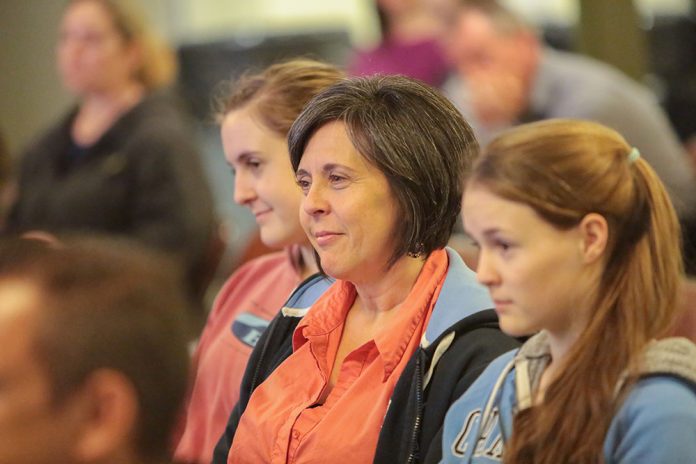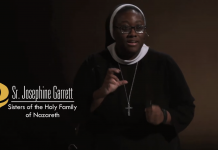
by Marlene Sweeney
I stood in the back of church with 120 restless children. These young children, about to receive their First Communion, were waiting for the signal to begin their procession down the center aisle.
Most DREs look forward to sacramental celebrations, the culmination of much work and preparation. That day, I was no exception. That would be my first celebration with this community, having only recently taken on the catechetical ministry in this parish.
Before I could start the procession, though, I noticed a young woman walking toward me with a determined gait and a less-than-happy expression on her face. As she approached me, I got the impression that she wanted to talk to me. So while watching for the cantor’s cue to begin the procession, I turned to the woman and asked, “May I help you?”
She proceeded to declare—in a loud voice—her complete displeasure with her family’s assigned seating arrangements. Apparently, her ex-husband was already seated in her designated pew and she was not willing to share that space with him. With hands flailing and tensions high, the woman demanded to know where I was going to find a place for her to sit—in what appeared to be a filled-to-capacity church.
Fortunately for me, a caring mother who had been helping me earlier, observed the scene and, immediately and gently, offered to find the distraught mom a seat in our reserved section. Meanwhile, I smiled at the children and began the procession.
Anticipate the Moment
This is only one of my memories of times that I have dealt with difficult people, tough situations, and criticism. Working for the Church does not guarantee immunity from public criticism or irrational personalities. In fact, in today’s cultural climate, you will likely experience an angry letter, a rude remark, a confrontational e-mail or phone message, or a petition or letter sent to the pastor concerning the ministry for which you are responsible.
Anticipate that moment. Expect that it will happen at some point, and consider your response before you are caught in the emotion of the moment.
It’s Not about You
Most of us dedicated to ministry tend to be people-pleasers. We want to speak and act in ways that are accepting and accommodating of the diverse population that we encounter daily. DREs generally find themselves balancing numerous parish responsibilities that include our own expectations of parishioners; in Christ’s model for the Church, we envision each person living up to his or her responsibilities.
Often, however, this is not our lived experience of Church. Hence, our professional role will come in conflict with others. When that happens, we may find ourselves the recipients of other people’s anger or frustration.
The most important lesson I learned in my early days of ministry was to keep in mind that it’s not about me. In other words, do not own another person’s emotions. Work at being objective. Listen to the other’s story or complaint without taking a protective or defensive posture.
Offer a Listening Presence
Most people just want to be heard. The situation or cause of contention most likely is a reflection of that person’s family issues or issues with the institution of the Church. The situation does not originate with you but rather, perhaps, who you represent.
Providing a listening and compassionate presence is a gift you might offer to a volatile situation. Depending on the circumstances, it always is best to establish a cooling-off period in which all those concerned can regain their composures and agree to meet and talk about the issues. (Obviously, this is not an approach that would have worked with the mother in church on the day of her child’s First Communion). Often it is helpful to invite a third party to facilitate discussion.
Go the Extra Mile
In many difficult situations, people unfortunately do not expect—or even want—reconciliation. Rather, they want to be confrontational and they look for a win/lose outcome.
I like to think that, in parish life, we can operate differently. If I invite a parishioner to come speak with me or a member of our staff, my hope is that we will come to some mutual ground where we all feel good—or at least better—about the situation.
Our coming together should be framed in prayer, listening, respect, confidentiality, and a willingness to go the extra mile for the kinship of God’s kingdom. I have found these rules to be simpler than we often make them out to be.
I am not suggesting that we be doormats for bullying adults or irrational personalities. These situations usually require professional intervention which we should not hesitate to seek when needed. Yet, few confrontations will be this extreme. Every difficult situation is unique. Learn from each one and rely on God’s goodness to teach you the way.
Marlene Sweeney, M.Ed., MA, is a Certified Pastoral Associate in the Archdiocese of Chicago. Marlene is a writer and poet whose works have appeared in numerous books and periodicals. E-mail Marlene at mcsjames@yahoo.com.
Copyright 2011, Bayard, Inc. All rights reserved. This article is protected by United States copyright and other intellectual property laws and may not be reproduced, rewritten, distributed, redisseminated, transmitted, displayed, published or broadcast, directly or indirectly, in any medium without the prior written permission of Bayard, Inc.




